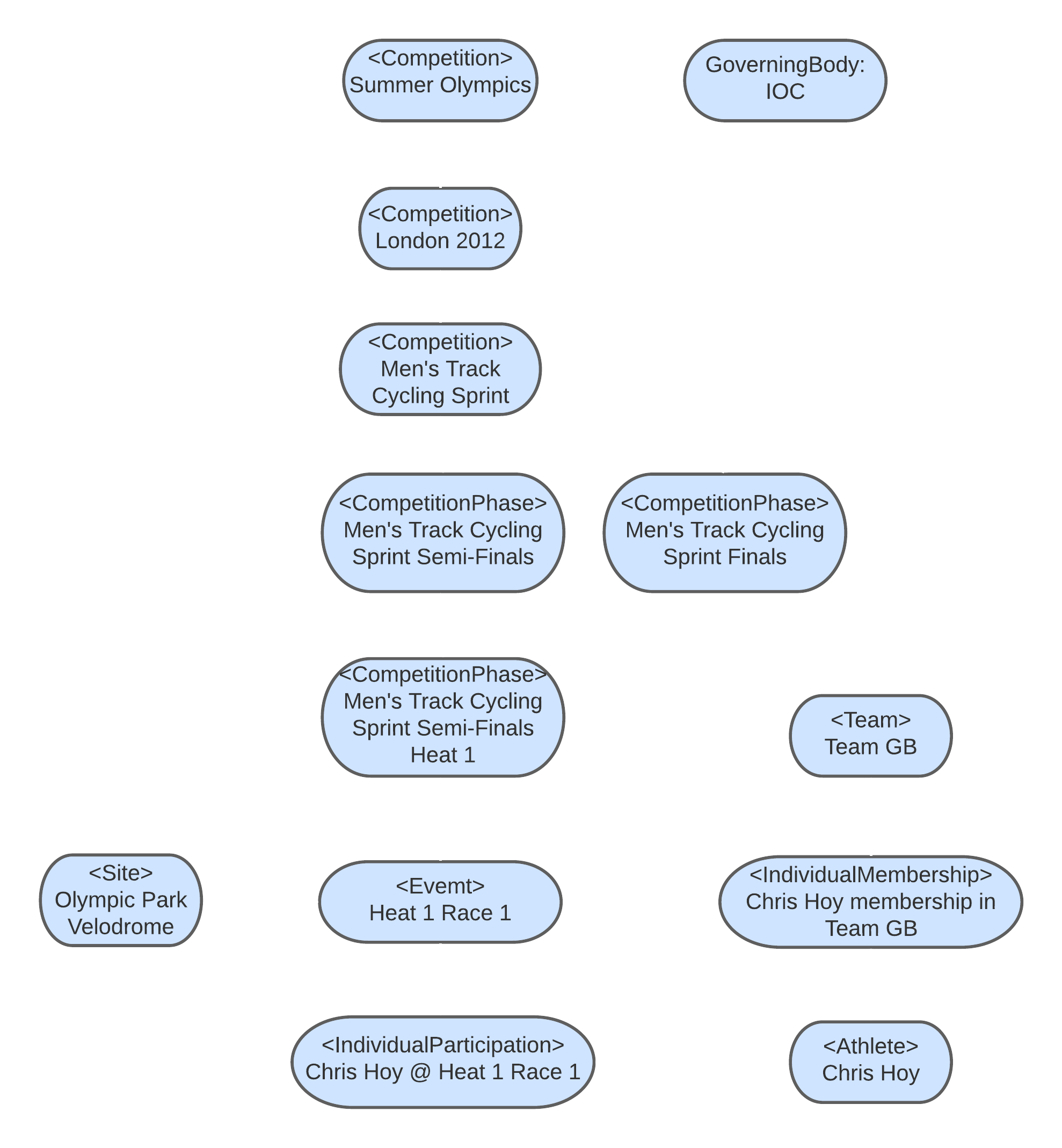Olympic Cycling Example
This takes the example instance diagram from the BBC Sport Ontology and shows how it would be represented using the IPTC Sport Schema model.

Below, we show how this looks using IPTC Sport Schema triples (using the Turtle format).
First, we define the generic concept of the Olympics as a “recurring competition”. The Summer Olympic Games competition is governed by the IOC:
<http://example.com/GoverningBody/IOC>
rdf:type sport:GoverningBody ;
rdfs:label "International Olympic Committee" .
<http://example.com/Competition/OLYS>
rdf:type sport:Competition ;
rdfs:label "Summer Olympics" ;
sport:competitionType spct:recurring-competition ;
sport:governedBy <http://example.com/GoverningBody/IOC> ;
sport:sport medtop:20000827 .
Then we create an instance of the generic Summer Olympics competition, which is a regular competition called the “2012 London Summer Olympics”.
<http://example.com/Competition/OLYS2012>
rdf:type sport:Competition ;
rdfs:label "2012 London Summer Olympics" ;
sport:competitionType spct:competition ;
sport:parent <http://example.com/Competition/OLYS> ;
sport:sport medtop:20000827 .
Within that Competition there would be a separate Competition for each medal. (Note that a medal is generally known in IOC terminology as an Event. We uses the term Event differently.)
<http://example.com/Competition/OLYS2012-CTRMSPRINT>
rdf:type sport:Competition ;
rdfs:label "Men's Track Cycling (Sprint)" ;
sport:competitionType spct:competition ;
sport:parent <http://example.com/Competition/OLYS2012> ;
sport:sport medtop:20001334 .
Each group of events is a CompetitionPhase. In this context, the semi-finals of the Men’s Cycling Sprint competition is a CompetitionPhase. Each Heat within the semi-finals is also a CompetitionPhase, so we use the generic parent construct to represent the relationship.
From the CompetitionPhase objects we link Participation objects that can be used to find the competitors.
<http://example.com/CompetitionPhase/OLYS2012-CTRMSPRINT-SFNL>
rdf:type sport:CompetitionPhase ;
rdfs:label "Semi-Finals" ;
sport:competitionPhaseType <http://cv.iptc.org/newscodes/sptournamentphase/semi-final> ;
sport:participation <http://example.com/Participation/OLYS2012-CTRMSPRINT-SFNL-PI1436558> , <http://example.com/Participation/OLYS2012-CTRMSPRINT-SFNL-PI1467923> ;
sport:phaseInCompetition <http://example.com/Competition/OLYS2012-CTRMSPRINT> .
<http://example.com/CompetitionPhase/OLYS2012-CTRMSPRINT-SFNL-00010000>
rdf:type sport:CompetitionPhase ;
rdfs:label "Heat 1" ;
sport:competitionPhaseType <http://cv.iptc.org/newscodes/sptournamentphase/heat> ;
sport:parent <http://example.com/CompetitionPhase/OLYS2012-CTRMSPRINT-SFNL> ;
sport:phaseInCompetition <http://example.com/Competition/OLYS2012-CTRMSPRINT> .
The individual races (things which someone can win or lose) are recorded as Events.
Here is the Event for Heat 1, Race 1.
The event takes place at the London Olympic Park Velodrome, which hasn’t been defined yet so we define it here.
<http://example.com/Event/OLYS2012-CTRMSPRINT-SFNL-00010001>
rdf:type sport:Event ;
rdfs:label "Heat 1, Race 1" ;
sport:eventInCompetitionPhase <http://example.com/CompetitionPhase/OLYS2012-CTRMSPRINT-SFNL-00010000> ;
sport:participation <http://example.com/Participation/OLYS2012-CTRMSPRINT-SFNL-00010001-PI1436558> , <http://example.com/Participation/OLYS2012-CTRMSPRINT-SFNL-00010001-PI1467923> ;
sport:startDateTime "2021-08-06T16:10:00+09:00"^^xsd:dateTime ;
sport:location <http://example.com/Site/s.29> .
<http://example.com/Site/s.29>
rdf:type sport:Site ;
rdfs:label "London Olympic Park Velodrome" .
Now we show how each player performed during the Event, via Participation objects.
We also define the Athlete object for cyclist Chris Hoy, who is the subject of the Participation.
<http://example.com/Participation/OLYS2012-CTRMSPRINT-SFNL-00010001-PI1436558>
rdf:type sport:IndividualParticipation ;
rdfs:label "Chris Hoy participation in Event OLYS2012-CTRMSPRINT-SFNL-00010001" ;
sport:participationBy <http://example.com/Athlete/PI1436558> ;
sport:rank "1" ;
sport:score "+0.107" ;
sport:scoreUnits <http://cv.iptc.org/newscodes/spscoreunits/relative> .
<http://example.com/Athlete/PI1436558>
rdf:type sport:Athlete ;
rdfs:label "Chris Hoy" ;
sport:nationality "GB" .
As well as being a Participant in the Event, Chris Hoy is also a member of the UK Olympic team, known as “Team GB”. We define that relationship here.
<http://example.com/Membership/TGBOLYS2012-PI1436558>
rdf:type sport:IndividualMembership ;
rdfs:label "Chris Hoy membership of Team GB" ;
sport:member <http://example.com/Athlete/PI1436558> ;
sport:membershipOf <http://example.com/Team/TGBOLYS2012> ;
sport:uniformNumber "29" .
<http://example.com/Team/TGBOLYS2012>
rdf:type sport:Team ;
rdfs:label "Team GB" .
